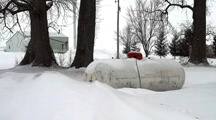Purdue Extension launches website on propane gas shortage
February 10, 2014
 |
|
A propane gas tank surrounded by snow sits on an Indiana property. This tank, like many others, is low on propane because of a shortage of the fuel, which is used in home heating. (Purdue Agricultural Communication photo/Steven Cain) |
WEST LAFAYETTE, Ind. - Purdue Extension has created a website to help homeowners and renters conserve propane gas and use it more efficiently in heating their homes as a shortage of the fuel continues.
The objective of the Extension Disaster Education Network website, launched Monday (Feb. 10), is to show how propane users can stretch their supply while at the same time free up more of the fuel for those who need it most.
"We want people to know that this crisis isn't just about them; it's also about their neighbors," said Abby Hostetler, an EDEN communications specialist who provided the information on the website. "We're encouraging users that if their tank is at least 30 percent of capacity to let others who might need propane more get it. So conserve what you have rather than rush to get more."
The website is at https://ag.purdue.edu/extension/eden/Pages/Propane-Conservation.aspx.
Propane users have been dealing with a shortage since early January in much of the U.S., leading to escalating prices, rationing of supplies and calls for customers to conserve what little gas they could get from suppliers. Bitter-cold weather, often well below zero in some regions, has made it especially difficult for them to make do with less gas to heat their homes.
Steven Cain of Brookston, Ind., EDEN homeland security project director, uses propane gas to heat his home. He noted that the price of propane, also known as LP gas, has risen from a fall contract rate of about $1.50 a gallon for 1,000 gallons in his area to a pay-as-you-go rate of more than $4 a gallon. Customers can get only partial refills because of the rationing.
"At the end of January, we received a letter from our supplier telling us to be prepared to seek alternative heating," he said. "We are watching the LP tank gauge very closely, conserving as much as we can and hoping to make it through February."
Among EDEN's conservation tips, which also apply to other home-heating systems:
* Reduce use of kitchen fans, bathroom fans and other ventilating fans, which pull air out of rooms. Leaving a fan on too long will result in more fuel being used to heat the home.
* Bundle up inside and wear multiple layers of clothing. That will help to retain natural body heat, allowing you to lower the thermostat.
* Turn down the thermostat at night and when you are away. Do not turn off the heating system. That could cause pipes to freeze.
Significant energy savings can be achieved with each degree the thermostat setting is reduced, said Al Heber, Purdue University professor of agricultural and biological engineering. In addition to wearing more clothing and using extra blankets, he said people can take several other steps to increase comfort when the thermostat is lowered, including:
* Putting rugs on bare floors.
* Humidifying the air.
* Trying zone heating where possible by turning down or shutting off the heat in unused rooms.
"A very cold and windy day is a good time to check for cold drafts due to air leakage around doors, windows, electrical fixtures and other openings in the exposed walls and ceilings of the home," Heber said. "Mark the locations where you feel cold air and seal up these drafts, even temporarily, until a permanent seal can be installed. Such seals would include caulking, weather stripping, and door and window replacements."
Heber said inefficient heating and lack of insulation - or improperly installed insulation - can result in 50-100 percent more heat energy use than necessary.
A thorough energy audit by a qualified professional can help homeowners determine the benefit of new windows, insulation or equipment compared with the cost, Heber said.
"Such a professional would have sophisticated tools to measure and detect air infiltration and leakage of the house, heating duct leakage into unheated spaces, insulation levels and gas leaks," he said. "They can also check the home for water, moisture and safety issues."
Writer: Keith Robinson, 765-494-2722, robins89@purdue.edu
Sources: Abby Hostetler, 765-494-4390, alillpop@purdue.edu
Steve Cain, 765-494-8410, cain@purdue.edu
Al Heber, 765-494-1214 or heber@purdue.edu
Ag Communications: (765) 494-2722;
Keith Robinson, robins89@purdue.edu
Agriculture News Page

